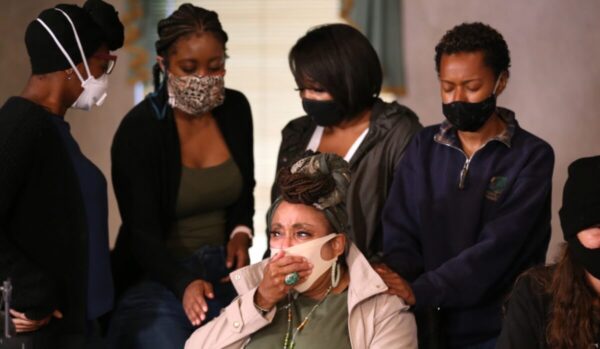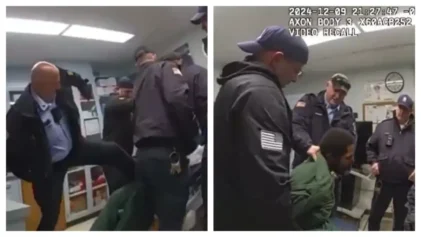Three Tacoma, Washington, police officers who were found not guilty in the case of Manuel Ellis, a Black man who died in police custody in 2020, will each receive $500,000 for resigning from the police department.
Chief Avery L. Moore announced on Tuesday that the officers voluntarily resigned and left in “good standing” despite one of them violating the department’s courtesy policy in 2020. All three were otherwise cleared of departmental violations under the policies at the time.
“These agreements support a responsible, constructive path forward for our community and the Tacoma Police Department,” Elizabeth Pauli, the city manager, said in a statement on Tuesday. “I acknowledge that healing throughout Tacoma will require time, open dialogue, and shared respect.”

Matthew Ericksen, a lawyer for Mr. Ellis’s family, criticized the agreements as “perverse.” He highlighted that the former officers had already received about $1.5 million in total during their nearly four years on leave.
“Everyone in the community should be upset by this,” Ericksen said.
Meanwhile, the U.S. Attorney’s office for the Western District of Washington launched an investigation into the fatal arrest of Ellis a month after the three officers were acquitted on charges of second-degree murder and manslaughter in his death.
The federal review aims to reassess the evidence in the state’s failed prosecution to ensure no pertinent facts were overlooked and to determine whether the officers would face civil rights charges in the 33-year-old Black man’s police custody death on March 3, 2020.
“If that review reveals violations of federal criminal statutes, the Justice Department will take appropriate action,” said Emily Langlie, spokesperson for acting U.S. Attorney for Western Washington Tessa Gorman.
No new evidence is expected to be introduced during the independent probe.
Ellis’ family held a press conference last week, saying they remained stunned by the verdict, and have called on the Justice Department to force the city of Tacoma to enact major policing reforms.
Previously, the Pierce County Sheriff’s Office faced criticism for botching the investigation after failing to reveal that one of its own deputies was involved in restraining Ellis, leading to federal scrutiny, as well as the creation of a new independent office dedicated to investigating police misconduct in the district.
The trial lasted more than two months and ended Dec. 21 with the acquittals of Matthew Collins, 40, Christopher Burbank, 38, and Timothy Rankine, 34 — two of whom are white — after defense attorneys successfully argued that Ellis died from methamphetamines he took before the fatal encounter and because he suffered from an enlarged heart. Rankine is Asian, the New York Times reports
While the Pierce County Medical Examiner concluded that Ellis died as a result of homicide from oxygen deprivation, the jury rejected arguments by prosecutors who accused the officers of causing Ellis’ death by beating, shocking, and choking the man while he was already hogtied and handcuffed on the ground.
On the night of his death, Ellis was unarmed and walking home with doughnuts from a 7-Eleven store.
He had not committed any crime when he was confronted by three white deputies, who held him down and brutalized him as he pleaded, “I can’t breathe.”
Moments earlier, Ellis had passed a red light where Collins and Burbank were stopped in their patrol car.
During the trial, defense lawyers claimed the officers observed Ellis trying to open the door of another car at the intersection and emerged from their unit to confront him about it, saying Ellis turned aggressive immediately, which led to a struggle on the sidewalk.
During testimony, Collins described Ellis as having “superhuman strength,” claiming the man picked him up and threw him during the scuffle.
But witnesses at the scene disputed this account, saying Ellis approached the squad car but did nothing to provoke the officers and that Burbank had flung open the passenger side door of the patrol car, which knocked Ellis to the ground.
Witnesses also testified that they yelled at officers to stop beating Ellis.
The incident was captured in part by a nearby doorbell surveillance camera, which showed Ellis with his hands in the air when Burbank shocked him in the chest while Collins got behind Ellis and applied a chokehold.
Rankine was among multiple officers who showed up to the scene after Ellis was already handcuffed on the ground, but the officer still put his knee down on the man’s back, leading to Ellis’ desperate pleas to be let up.
“I can’t breathe, sir. I can’t breathe, sir. I can’t breathe,” Washington Assistant Attorney General Kent Liu told jurors in October when describing Ellis’ last words.
But Rankine testified that he was unmoved as Ellis begged him to get off his back as he struggled to breathe.
“The only response at that point that I could think of is, ‘If you can talk to me, you can still breathe,’” Rankine testified.
Ellis’ death coincided with the outbreak of the COVID-19 pandemic and received little attention compared to the police killing of George Floyd more than two months later in Minneapolis.
The charges were filed against the officers under a relatively new state law aimed at making it easier to prosecute police accused in cases of excessive force.
The Ellis case was the first to test the provision, approved in 2018 and known as Initiative 940, which eliminated a unique requirement that prosecutors prove officers acted with actual malice to bring criminal charges.
It also mandated independent investigations following instances where the use of force led to death or severe bodily harm, among other provisions.
An ongoing internal affairs investigation into the fatal arrest could result in a decision on potential disciplinary actions for the officers “up to and including termination.”
Last year, the Ellis family settled a federal wrongful death lawsuit against Pierce County, where Tacoma is located, for $4 million.
The officers still face a separate lawsuit from Ellis’ family, filed in U.S. District Court in September 2021, that had been on hold due to the criminal trial.
The civil case includes claims against two additional officers — Masyih Ford, who helped restrain Ellis, and Armando Farinas, who placed a spit hood on the victim — who were cleared to return to duty after an internal review found they did nothing wrong.


